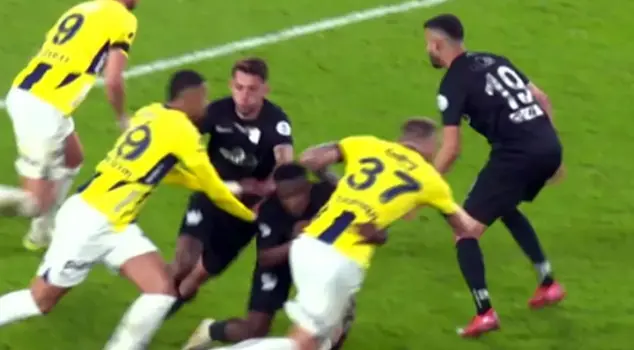
03.02.2025 08:30
In the Super League, Fenerbahçe defeated Çaykur Rizespor 3-2 at home. The controversial moments in the match were analyzed by the Trio team consisting of Bülent Yıldırım, Bahattin Duran, and Deniz Çoban. They evaluated the situations of Olawoyin and Rachid Ghezzal from Çaykur Rizespor, who received red cards, as well as the penalty decision awarded in favor of Fenerbahçe. The Trio team stated that the referee's decisions were generally correct.
In the 22nd week of the Super League, Fenerbahçe defeated Çaykur Rizespor 3-2 at home. Olawoyin and Rachid Ghezzal received red cards for Çaykur Rizespor. The trio team of Bahattin Duran, Bülent Yıldırım, and Deniz Çoban evaluated the controversial positions on beIN SPORTS.
Was the penalty awarded to Fenerbahçe correct?
Deniz Çoban: The defending players are busy turning their backs to the ball and watching the opponent. If the ball comes, it will hit their heads. This position is a penalty. Olawoyin held Skriniar. You did everything to prevent the opponent from going with his body and head, even if it was just with one hand. This is undoubtedly a penalty. The VAR intervention is correct. The foul in the off-the-ball area is also undoubtedly a yellow card. Olawoyin's first yellow and second yellow are both correct.
Bülent Yıldırım: Olawoyin's foul is amateurish; you are leading 2-0. You are holding the opponent clearly, effectively, and strongly, without any intention to play the ball, for a long time. Until you bring the opponent down. It would have been better if it had been seen on the field. The VAR intervention is one hundred percent correct. The effect and holding are very clear. In principle, fouls in off-the-ball areas are categorized as unsportsmanlike, the second yellow card is correct.
Bahattin Duran: He wrapped with his left hand, leaned his head, grabbed the waist with his right hand, and leaned his body, neck, and head on Skriniar, not looking at the ball at all. His only aim is to prevent his opponent from playing. The ball is in play, the movement has started and continued. Undoubtedly a penalty on the field. The VAR intervention is correct. There is a lot of evidence here. He wrapped with his left hand, held with his right hand, and disrupted with his head, neck, and entire body. VAR is correct, the penalty is correct, the second yellow card is correct.
Is the yellow card for Amrabat's foul on Ghezzal correct, or should it have been a red card?
Bahattin Duran: It comes from the shoe to the ankle, taking off the shoe. I find the yellow card sufficient. Why? He stepped with the tip of the lower part of the cleat, there is no complete transfer of force, half of the sole is on the ground; if he had stepped and transferred his power, it would have been a red card, but in this form, a yellow card is sufficient.
Deniz Çoban: This position is a classic yellow card. The heel is on the ground, the knee is bent. This position occurred after the referee did not give a penalty. The game stopped here for VAR intervention. Since the next part of the game has passed, a foul occurred. The uncontrolled movement remains, the yellow card stands.
Bülent Yıldırım: The heel being on the ground affects the transfer of the player's center of gravity towards the opponent's tendon, reducing force and effect. The contact point stepped on the cleat. If it were a little higher, it would have been a red card.
Was the referee's decision correct for Rachid Ghezzal's red card?
Bahattin Duran: Ghezzal threw himself to the ground. Because this took too long, the referee already took the yellow card in his hand. It was clear that he would show a card to Ghezzal before the player substitution; a dialogue occurred between them. After showing the yellow card, Ghezzal received a direct red card. Ghezzal was sent off with a direct red card. After the applause. Ghezzal also shared on his social media account, he used a curse that starts with 'f' and ends with 'off'. I experienced this in a derby in 2009, with Colin Kazım, he was running towards me while saying things. There is an open case there too, but if you curse in front of the referee's face, it is a curse in our culture. If you have been playing here for years, you know that this is a curse. If you say it to the referee's face from a close distance, you will be sent off. I think it is correct. The player wrote what he said on his account...
Bülent Yıldırım: He said this expression to the referee's face from 1-2 meters, a maximum of 3 meters. I do not agree with the cultural argument. At this distance, there is no culture for this word that starts with 'f'. How many players are there who heard this word? There are four players. You are saying a word that starts with 'f' from two meters away. If I were in that position, I would also send him off.
Deniz Çoban: The word in question is not considered a curse in Europe, but it is a curse in our culture. If I were responsible for a team, I would tell the first foreign player I signed that this word is a curse in our culture, do not use it against the referee. The player would keep this in mind and not say it to the referee. If the referee hears this in Turkish culture, he should send you off; he must send you off. Those who did not send off, that is another issue. If I were the referee, I would also send him off. This is a humiliating, degrading expression.